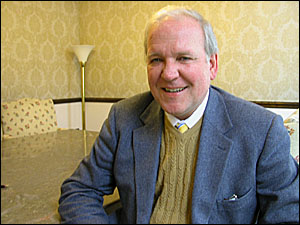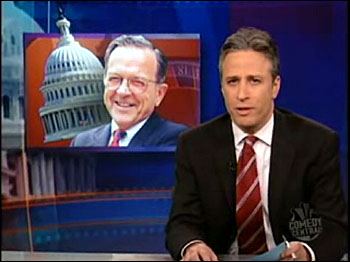 |
 | ||
 |
||
|
Part 1, 2  Ben Scott, policy director for Free Press, a nonprofit lobbying firm focused on media issues. One ally was Free Press, a nonprofit that lobbies on media issues. Its policy director is an idealistic graduate student named Ben Scott. A former Hill aide himself, Scott saw the power of the telecom side, and its deep pockets for lobbying and advertising. Scott decided to counter it by building a massive coalition of strange bedfellows. It began with a simple idea. "We do all of our communications with our members on the Internet. We thought, 'That's going to be true of every organization that organizes online,'" said Scott. "So, for the same reason MoveOn joins the Save the Internet coalition, so does the Christian Coalition." Michelle Combs, spokesperson for the Christian Coalition, had no problem joining forces with left-of-center groups. Her group typically focuses on pro-life and pro-marriage policies but Combs said she was worried that an Internet fast lane would leave them in the dust. "We use the Internet so much on a daily basis, with our action alerts," said Combs. "They knew this would really affect us." See an accounting of spending by lobbying entities from PoliticalMoneyLine. Combs spread the word to church groups. "I was at a meeting the other day at a church and I explained it and these ladies that I was talking to," recalled Combs. "They're not political, and they totally got it because they go on the Internet and they shop. They look at the news and they also have a small, little Web site. They have a little business. I think it's a wrapping paper business. ... It was like, 'Oh, my gosh. Where can we sign up? We've got to tell our friends about this.'" The Christian Coalition took out ads with MoveOn on behalf of Net neutrality. The odd couple got noticed. Gigi Sohn, of Public Knowledge, said these groups and hundreds of others would turn the Save the Internet coalition into a formidable grassroots organization. "The grassroots fits into this because there's only one thing in Congress that will trump the power of the cable companies and the telephone companies and that's constituents," she said. "It's the key."  Still from We Are the Web video by Minneapolis ad agency Space150. The grassroots filled blogs with arguments for Net neutrality. Individual supporters, many of them college students, posted homemade treatises and PowerPoint presentations online. Some of the viral videos, passed around on the Internet, were slick. A Minneapolis ad agency, Space150, produced a send-up of "We Are The World," in which rock stars sang to raise money for African famine in the 1980s. We are the Web featured a bunch of eccentric Internet celebrities dancing around in tights. E-mail links to the video traveled around the world. Back in Washington, where people do not dance around in tights, the telecom companies took notice of the coalition's success on the Internet and decided to respond with their own blogs and viral videos. They pay Scott Cleland, a former telecom industry analyst turned spinmeister, to blog all day long on a site called NetCompetition.org. It's one of the first times that professional lobbying has taken to the blogosphere. It's a lot of spin, but sometimes there are actual ideas and arguments. On the morning I visited Cleland, he was blogging about the "myths" of Net neutrality, offering his refutations. His home page, however, was set to Yahoo, one of the companies that proffers these so-called "myths." "I must admit, I Google-search all the time," said Cleland. "I don't have anything against these companies' products. I think their products are great. I just don't like their position on Net neutrality." Cleland doesn't think Google and the Internet giants are really so outgunned in Washington. He points out that Google's stock is worth almost $150 billion, making it bigger and richer than any of the telecoms it's fighting against. "They're saying, 'Oh we're doing this grassroots and pure.' They're just doing it the cheap way and the way that leverages their assets best, but they're not Bambis. They're spending a good amount of money in Washington," said Cleland. So are Cleland's benefactors: the telephone and cable companies. They had Republican support and the legislation written to their liking. But to really sew things up, so that the legislation could cross the finish line in the Senate, they needed a few Democratic allies.  Former press secretary for President Clinton Mike McCurry who now lobbies for the telecom side in the Net neutrality debate. They tapped Mike McCurry, a former Clinton press secretary. "I have had a real interest in the Internet from my time at the White House. Remember, I was the White House press secretary when the Drudge Report showed up for the first time," said McCurry. The Drudge Report was the Internet site that published allegations of the Monica Lewinsky scandal that ultimately threatened the Clinton presidency. Ask McCurry why he got hired and he manages to answer the question and spin his employers' position all in one sentence: "They wanted someone who had Democratic credentials who believed that there was a better approach than a heavy-handed federal regulation to come into the debate and provide a different side to the story," McCurry said. To fight it, McCurry invited some bedfellows of his own. "We had an interest in putting together something other than the typical right-wing, free-market coalition. Those are a dime a dozen," said McCurry. McCurry reached out to groups like the Latinos in Information Sciences and Technology Association and the National Coalition on Black Civic Participation. Hands Off The Internet, or HOTI as he lamented in hindsight, was born. He also got telephone union workers to visit the Hill. McCurry had a strong hand. In early June of 2006, the full House passed the telecom bill just the way the phone and cable companies wanted it with no Net neutrality. As the bill moved to the Senate, the phone companies stepped up their advertising in Washington. One of their ads proclaimed, "The big online companies want the next generation of the Internet to be built. But they don't want to pay for it. They want to stick consumers with the bill. And they call it Net neutrality." Ron Wyden, a Democrat from Oregon, was Google's staunchest ally in the Senate. He remembers the lobbying was intense. "From the number of senators who came up to me and said, 'Holy Toledo,' or something like that. 'I haven't seen anything like this. I'm getting pounded from all directions,'" said Wyden. And in an unlikely twist, this lobbying battle became a hit on the Jon Stewart's Daily Show. In late June, Senator Stevens, the committee chairman who was visited by the eBay crafter from Alaska, held a hearing to finish up his telecommunications bill. Stevens gave the audience a lesson on the Internet. "It's not a truck. The Internet is not something that you just dump something on. It's a series of tubes," he explained.  Jon Stewart's Daily Show "reporting" Senator Stevens's lesson on the Internet. Gigi Sohn of Public Knowledge was paying attention. One of her interns recorded Stevens's tubular speech from the webcast of the markup. He posted it on Public Knowledge's Web site. Somehow it wound up in the hands of Jon Stewart's writers, who likened it to the ravings of drunk at an airport bar at 3 a.m. Viewers converted the Stewart bit into a video clip and passed that around the Internet. It galvanized the Internet community, the so called Netizens or Net-roots, that supported Google. Still, back in Washington, Senator Stevens managed to muscle his bill favoring the phone companies through his committee. Google's side was on life support. Their only hope was to stall. Google's friend Senator Wyden, obliged. Wyden would need to convince enough senators that Google's Net neutrality was important enough to derail an entire telecom act. That required immense political pressure. This is where Google's grassroots friends came storming in like cavalry. They urged their members to blast senators with e-mails and hold rallies around the country. They collected 1 million signatures for a Net neutrality petition. The pressure was enough to hang up the bill in the Senate through to the 2006 elections. Voters turned control of Congress over to the Democrats. GOP legislation, including the anti-Google telecom bill, was dead. Senator Wyden credited public opinion, not lobbyists and their money, for stopping the telecom side. "In the end of the day on this, I think that the hundreds of citizens groups that weighed in showed they were able to take on an extraordinary amount of financial firepower and prevail," said Wyden. In truth, nobody won. The telephone companies didn't get the telecom bill they wanted. And Google didn't get its Net neutrality law. See a list of PAC contributions by industry from PoliticalMoneyLine. But lobbyists got a lot of money. Google alone says it has spent $1 million on its lobbying activities. Its rival, the United States Telecom Association, spent more than $15 million in the first half of 2006, more than any other lobbying group in the nation. The communications sector combined spent more money on lobbyists than any other industry, more than pharmaceuticals and big oil. Google didn't win round one, but Adam Davidson says all the money and time spent lobbying was worth it. "We learned we need to be here," said Davidson. Google is already gearing up for round two. Google's coalition is again pressing the Bush administration to block the AT&T merger with Bell South unless the combined company is barred from levying new fees for the Internet fast lane. And the Internet companies are eyeing round three: lobbying the new Democratic Congress for a law. This time around, they're playing the imperial Washington game by time-honored rules. Google started a political action committee. That's a fund executives and other employees can contribute to. Lobbyists use the money to make contributions to the campaigns of lawmakers who support their cause, because to really get things done in the Imperial City, you need ideas, you need friends, and you need money. Back to Imperial Washington |
||